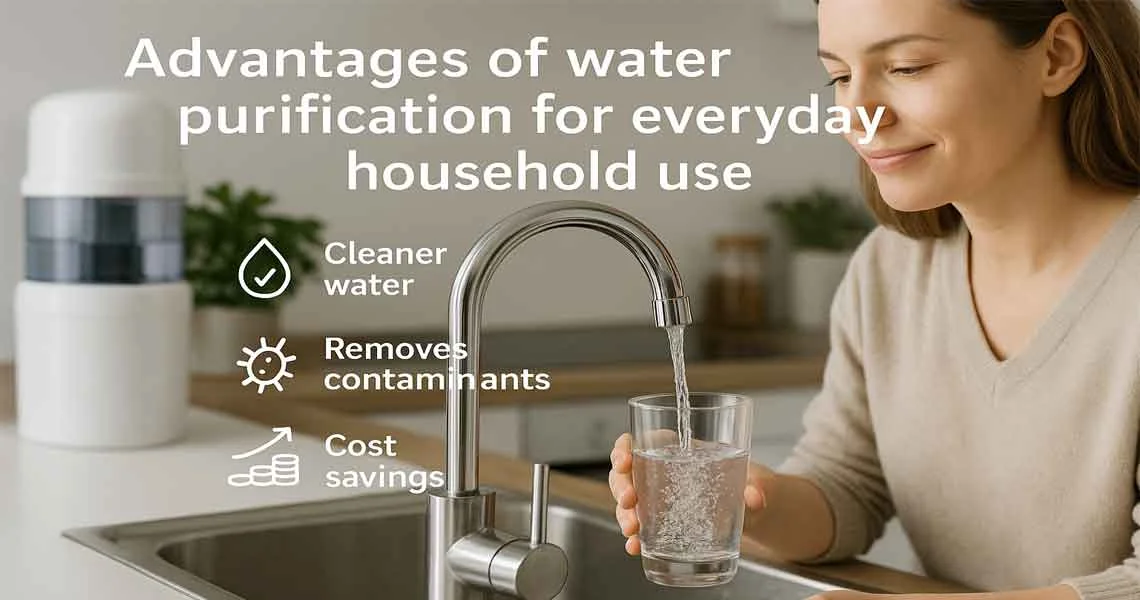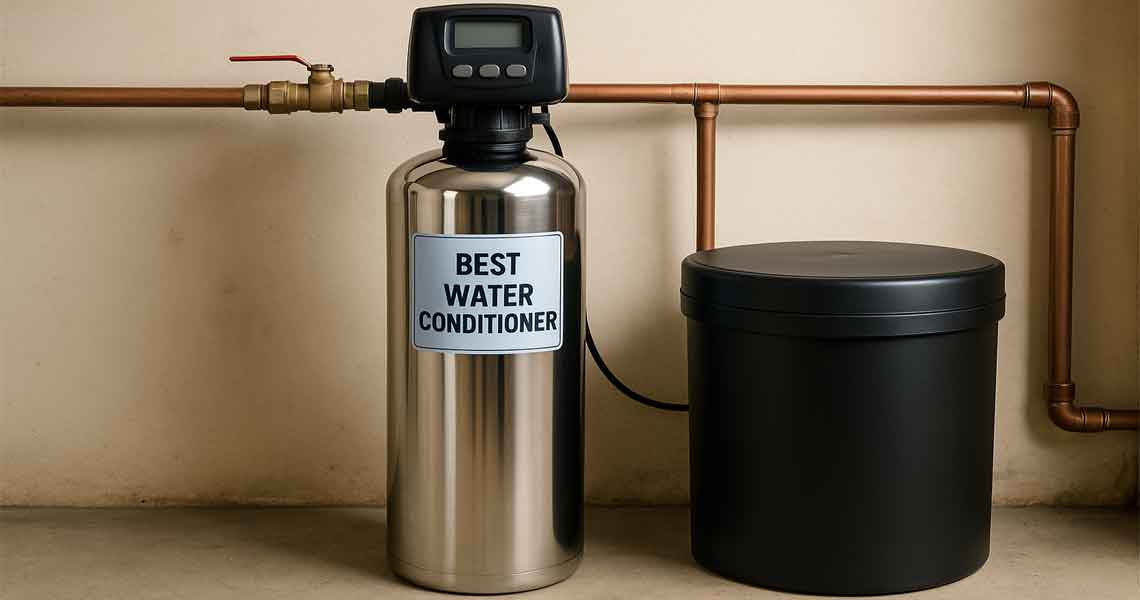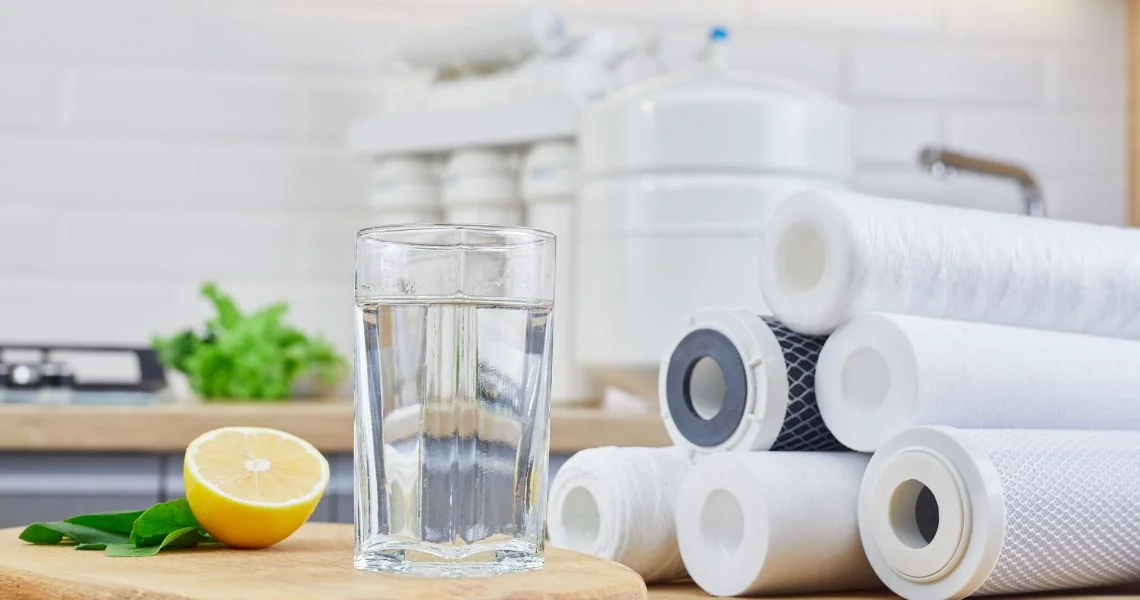What is the most crucial thing you require while doing your chores? You are correct; water is a vital part of our lives, and we must guarantee that we drink clean, filtered water. So, how does a water purification system work? This blog will examine the water purification process and the various types of water purifiers available, allowing you to decide on the best whole house water purification system for your household. We’ll also talk about the characteristics that make a water purifier the perfect choice for your needs. By the end of this essay, you’ll better grasp how does a water purification system work and which one is right for you.
The Water Purification Process
We utilize water in one way or another every day. We rely on water for drinking, cooking, and cleaning our hands and surfaces. However, some water we consume is unsafe to drink or use. This is when water purification and sewage management systems come in useful.
Several types of water filtration systems are on the market today, each with advantages and disadvantages for water purification. Before you install your system, be sure it’s the perfect one for you to get the most out of it.
According to the 2025 Wellness Water Report, “the average American home has over 15 contaminants in the water coming through its faucets, with at least 6 exceeding the EPA’s health guidelines.” This highlights why selecting the best whole house water purification system is not just about convenience—it’s a health priority.
Here are some crucial elements to consider when selecting a water purification and sewage management system.
Types of Water Purifiers
No dispute, maintaining the quality of our water is critical. Clean and filtered water keeps us healthy and is necessary for cooking, cleaning, and other household duties. So, let’s look at the many sorts of water purifiers and their usefulness in residential applications.
- First and foremost, how does a water purification system work in domestic applications? It ensures we protect our families’ health. We safeguard our water by employing a particular filter or distilling it from hazardous impurities such as germs and viruses.
The Wellness Water Report also emphasizes that waste water purification methods must address inhalation risks, not just ingestion. “Hot showers can release up to 80% of dissolved chemicals into the air, where they’re inhaled through the lungs or absorbed through the skin,” warns the report. This makes whole-home systems vital for safe air and water exposure.
- Furthermore, using the best whole house water purification system with a high filter effectiveness rate can limit the amount of trash that must be disposed of through conventional waste water purification methods.
- Another significant consideration when choosing a water filter is its ability to eliminate specific impurities. For example, reverse osmosis systems effectively remove heavy elements such as lead and mercury from drinking water.
- Meanwhile, distillation systems are excellent at removing pollutants such as pesticides and herbicides from our drinking water. However, not all contaminants can be removed by these systems, so check the product specs carefully before deciding.
- Maintaining your best whole house water purification system clean and free of particles will help it perform more effectively. Furthermore, regular testing can help you identify areas for improvement, ensuring that your system remains effective over time.
- Furthermore, regular testing can help you identify any areas for improvement, ensuring that your system remains effective over time. It’s worth noting that “filtration units, if not serviced at least once per year, can become breeding grounds for bacteria that keep you sick,” according to the report. Regular maintenance isn’t just about performance—it’s about preventing the risks associated with poorly filtered water, especially when using waste water purification methods.
- Finally, safety precautions should always be observed while using any filtration system, since even minor errors might cause significant health problems. Remember that waste water purification methods are healthy for your family and the environment!
Furthermore, the report highlights that chemicals like chlorine—commonly used in municipal supplies—interact with other pollutants to form trihalomethanes (THMs), which are known carcinogens. This makes the advantages of water purification not just practical but essential for long-term health protection.
Selecting the Best Water Purifier for You
Everyone’s water requirements differ; therefore, choosing the correct type of water filtration system is critical for you. Many types of systems are on the market, and deciding which is ideal for you can be tough. This section will review the various systems and explain how does a water purification system work in each. We will also discuss some crucial aspects to consider when choosing a water purifier and how to choose the best whole house water purification system depending on your requirements.
There are three basic types of water purification systems: activated carbon filters, reverse osmosis membranes, and UV light units. Each system has advantages, so it is critical to select one that is appropriate for your needs.
Wellness Water’s findings also show that contaminants like fluoride, lead, and pharmaceutical residues are frequently found in tap water, making it critical to assess purification units’ ability to target specific toxins. The best whole house water purification system should ideally reduce plastic particles, heavy metals, and hormone-disrupting chemicals—all reported in over 80% of tested samples.
- Activated carbon filters are the earliest type of water purification and sewage management technology and are still widely used in homes and businesses today. They effectively remove germs and other pollutants from water.
- Reverse Osmosis membranes purify polluted water by pushing pressured freshwater through a semipermeable membrane. The process is quick, making it perfect for all types of families and demonstrating how a water purification system works on a more advanced level.
- UV light units use short-wavelength ultraviolet light to destroy germs and other pollutants in water. They are often more expensive than other devices but provide better germicidal activity against bacterial spores and viruses. Choosing the best whole house water purification system often involves comparing UV, RO, and carbon technologies.
Before making a purchasing decision, it is critical to understand the varying efficiency levels provided by different types of waste water purification methods. Some systems have high efficiency levels, while others have lower levels; selecting the most effective filter system for your specific needs is critical. In addition to screening pollutants, activated carbon filters may remove minerals like magnesium and calcium from tap water. It is therefore vital to establish which pollutants are most hazardous for you before making a buying decision.
Once you have selected your type of system (or systems), it is time to test which one is best suited for each need based on factors such as budget, household size, and family size. This choice comes with many advantages of water purification, from better health to less waste.
Understanding the Different Technologies and Processes of Water Purification
Water is necessary for human and animal health, and a clean, safe supply should always be available. Unfortunately, many people continue to live in locations where the water is unsafe to drink. To guarantee that you and your family have access to safe drinking water, you must understand how a water purification system works and the technologies involved.
- Distillation is one of the most often used waste water purification methods. This method involves boiling water until it turns into a gas or steam mixture. The gas or steam is subsequently condensed into liquid form, which can be drunk or stored. It’s highly effective for water purification and sewage management in homes and industries. However, distillation can be time-consuming and requires ongoing maintenance.
- Reverse osmosis, often featured in the best whole house water purification system models, uses high pressure and a membrane to remove most pollutants. It forces high-pressure water through a membrane, separating salt from the freshwater being pumped in. This method removes most contaminants from drinking water while preserving essential minerals. However, reverse osmosis equipment is expensive and must be maintained carefully to avoid polluting drinking water with salt or other minerals in high proportions.
- Carbon filtration systems are another prominent method for purifying drinking water. These systems use carbon filters to catch tiny molecules before they reach the drinking glass or container filled with tap water. The Wellness Water Report also discusses ozone purification as one of the advanced waste water purification methods. It’s effective against various pollutants, including bacteria, heavy metals, pesticides, and even pharmaceutical drug residues.
- Ozone therapy, which uses ozone gas as an oxidizing agent, has also been shown to be an effective method for removing bacteria, viruses, protozoa, cysts, chemicals (including pesticides), heavy metals (such as lead and mercury), turbidity (cloudiness), odors, taste impurities (such as chlorine), pharmaceuticals (including hormones), and other contaminants from drinking water.
The most important thing you can do to provide your family with safe, clean drinking water is to install a water filtration system. With so many systems available, selecting the best one for your home can be tough. However, by studying the various technologies and methods used in water purification, as well as considering aspects like budget and household size when making a purchasing decision, you can locate a system that will offer you and your family safe and clean drinking water. Act now by researching several types of purifiers or consulting an expert to choose the best system for your needs.
As the report concludes, “it’s just a matter of time before whole-house filtration becomes as essential as having a refrigerator or a stove.” Combining filtration, alkalinity balance, and remineralization is key to realizing the full advantages of water purification in today’s environment.
Wellness Water Purification: The Solution for Your Home or Business
Wellness Water Purification provides people with modern equipment to ensure the advantages of water purification are accessible to everyone. Whether it’s your home, small business, or industrial setup, we offer the best whole house water purification system to suit your water needs.
Our specialists focus on matching systems to your usage and location so you benefit from proper waste water purification methods and enjoy the perks of clean, safe water.
Invest in Clean, Healthy Water Today
Tap water containing unwanted elements and particles should not be taken lightly. Purchase a filtration system from Wellness Water Purification to embrace the advantages of water purification.
We help you understand how does a water purification system work so you can select confidently. Seize the day—ensure your home has the best whole house water purification system that reflects the best of waste water purification methods and advanced water purification and sewage management systems.





